Envoy criticizes IAEA chief’s assessment of new Iranian law

TEHRAN — Iran’s ambassador and permanent representative to the Vienna-based international organizations has criticized the head of the International Atomic Energy Agency’s remarks, saying the IAEA is only responsible with monitoring and verifying Iran’s nuclear-related measures.
“@iaeaorg sole role is to monitor and verify the voluntary nuclear-related measures as detailed in the JCPOA and to provide regular updates in this regard,” Kazem Gharibabadi wrote in a tweet on Friday.
“Any assessment or analysis is out of the mandate of the Agency,” Gharibabadi added.
It came after IAEA Director General Rafael Grossi told Sky News that Iran should not follow through on threats to increase uranium enrichment and throw out his inspectors.
“If implemented,” he said, “these measures would be an even further deviation from the commitments that Iran entered into when it joined the agreement.”
“I cannot imagine who would win from such a situation. If there was any limitation of the IAEA inspectors as a result of this or any other situation were curtailed in their work,” Grossi added.
He was referring to a recent move by Iran’s Parliament that pushed nuclear program forward in order to fight the U.S.-imposed sanctions.
The Parliament passed the strategic action plan earlier this month. According to the 9-article bill, the Atomic Energy Organization of Iran (AEOI) will be required to produce and store at least 120 kilograms of enriched uranium with 20 percent purity at the Fordow nuclear facility every year, and to fulfil the country’s peaceful industrial demands with uranium enriched above 20%.
The bill became a law as the oversight Guardian Council approved it by asking the parliament to make some amendments to it. It will oblige the AEOI to increase the monthly output of enriched uranium for various peaceful purposes with different purity levels by at least 500 kg.
The parliamentary ratification also obliges the AEOI to stop the Additional Protocol to the NPT if sanctions are not lifted. The Additional Protocol allows for surprise and unannounced inspections.
Iranian lawmakers accelerated the process of passing the nuclear bill following the assassination of top Iranian scientist Mohsen Fakhrizadeh and even described the bill as one of Iran’s options to respond to Israel by resuming nuclear activities.
The bill, put forward by the lawmakers in early November, is part of a broader strategy that aims to lift the United States sanctions on Iran. It aims to force the United States into lifting sanctions on Iran by doubling down on nuclear activities.
MH/PA
